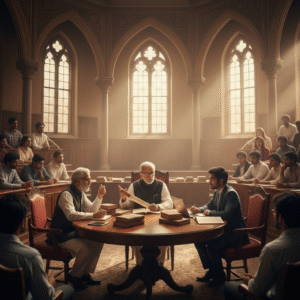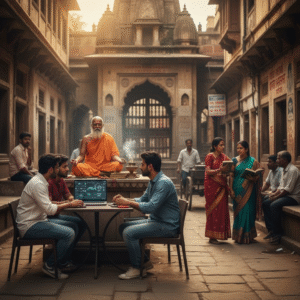Literature has always been a profound medium for expressing and preserving Hindu philosophy, offering insights into the timeless wisdom of the Vedas, Upanishads, Puranas, and epics like the Mahabharata and Ramayana. These texts, steeped in allegory and symbolism, transcend mere storytelling to illuminate intricate spiritual, ethical, and metaphysical ideas.
Timeless Scriptures: The Foundation of Hindu Thought
At the heart of Hindu philosophy lies its ancient literature, beginning with theVedas, considered the oldest known texts of human thought. The Vedas, particularly the Rigveda, introduce foundational concepts such asrita(cosmic order) anddharma(duty), which continue to shape Hindu ethics.
TheUpanishads, often called the crown jewels of Indian philosophy, delve deeper into existential questions, exploring the nature of the self (atman) and its unity with the ultimate reality (Brahman). Their verses, rich in metaphors and paradoxes, challenge readers to transcend sensory perceptions and embrace self-realization.
Epics as Philosophical Narratives
The Mahabharata and Ramayana, while widely regarded as epic tales, serve as vessels for profound philosophical discourse. The Bhagavad Gita, embedded within the Mahabharata, distills the essence of Hindu philosophy through Krishna’s counsel to Arjuna, addressing dilemmas of duty, morality, and spirituality. Its teachings onKarma Yoga(selfless action),Bhakti Yoga(devotion), andJnana Yoga(knowledge) offer practical wisdom for navigating life’s complexities.
Similarly, the Ramayana transcends the narrative of Rama’s journey to symbolize ideals of righteousness, resilience, and the triumph of dharma over adharma (chaos).
The Puranas and Storytelling Traditions
ThePuranas, a rich repository of mythological and cosmological narratives, bring Hindu philosophy to life through allegorical stories. Texts like the Bhagavata Purana celebrate devotion and articulate intricate cosmological ideas in an accessible manner. These works, often recited in public gatherings, democratize philosophy by making it relatable and engaging for the masses.
Modern Literature and Interpretations
In contemporary times, authors such as Swami Vivekananda, Radhakrishnan, and Devdutt Pattanaik have reimagined Hindu philosophy for global audiences. Their works bridge the gap between ancient wisdom and modern sensibilities, ensuring its relevance in today’s rapidly evolving world.
Additionally, translations and reinterpretations of classical texts have expanded the reach of Hindu thought, inviting diverse audiences to explore its universal themes of interconnectedness, ethics, and self-awareness.
Conclusion
Through its vast and varied literary tradition, Hindu philosophy has transcended time and geography, offering profound insights into the human experience. Whether through sacred hymns, epic poetry, or modern interpretations, literature continues to be an indispensable medium for conveying the depth and universality of Hindu thought, inspiring seekers across generations.












